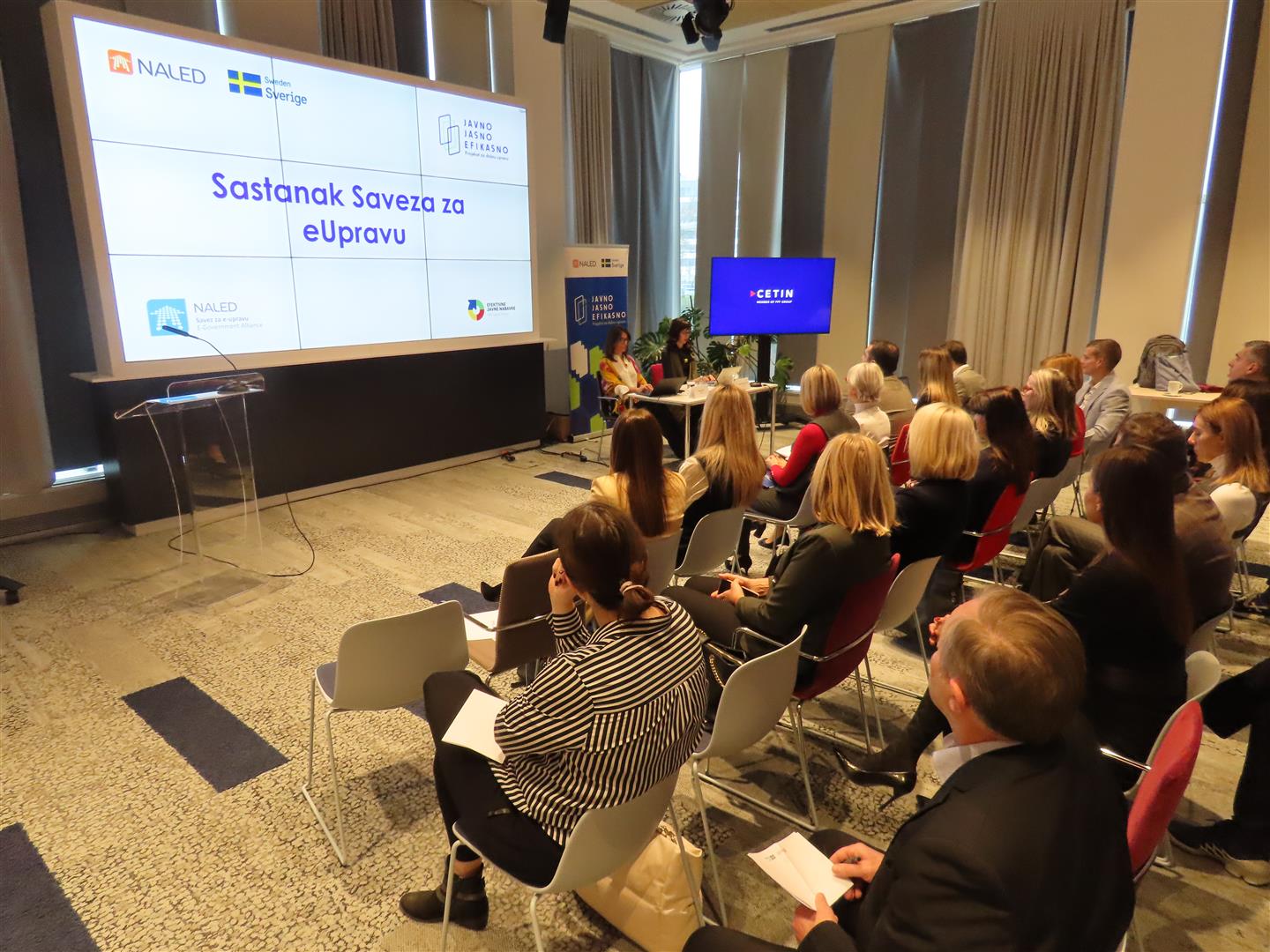Law on broadband infrastructure is one of eGovernment Alliance priorities
The year's last session of NALED's eGovernment Alliance was held on 8 December. At the beginning of the event, the president of the eGovernment Alliance Dragana Ilić, in front of CETIN company, which was also the host of this meeting, presented the results of the Alliance achieved during 2023.
- Regulation of the use of artificial intelligence through guidelines, participation in the adoption of the eGovernment Development Program, the Law on Electronic Communications, conducting training for local governments and small and medium-sized enterprises in the fields of electronic business, information security, electronic administrative procedures are just some of the results we achieved in the previous year. We see the priorities for the future in the adoption of the Law on Information Security, the Law on Broadband Infrastructure, and we also expect the successful use of the electronic office and the launch of the eArchive in the entire public administration - emphasized Ilić.
The special guest of the session was Assistant Minister for Electronic Communications and Postal Traffic in the Ministry of Information and Telecommunications, Katarina Tomašević, who reviewed the results of the Ministry so far and the activities planned for the next period.
- When it comes to the Ministry of Information and Telecommunications, we are perhaps one of the most recognizable state bodies dealing with the topic of electronic administration. In the previous year, we did a good thing - we passed the Law on Electronic Communications, while now it is planned to pass by-laws in that domain. We are especially glad to hear the initiatives of the members of the Alliance for eGovernment, because they help us in further planning the development of eGovernment and the digitization of our country - stated Tomašević, stating that she personally advocates for digitization and electronic administration, as well as the reduction and improvement of bureaucratic procedures that burden the economy and citizens.
Also, at the meeting of the Association, it was highlighted the implementation of a large number of trainings this year, both for local self-governments and for small and medium-sized enterprises. As part of the project "Public Procurement and Good Management for Greater Competitiveness", which is supported by the Swedish Agency for International Cooperation and Development, five live trainings on the subject of electronic administrative procedures were conducted for 123 officials from 60 LGUs, then two online trainings for as many as 440 officials from LGUs, as well as five trainings for almost 190 officials from all 38 public archives on the topic of using the new eArchiv software, as part of field visits to local governments. Also, three technical trainings were conducted for 22 IT administrators from 17 LGUs on the subject of information security, in cooperation with the National CERT of Serbia at RATEL. A training cycle for small and medium-sized enterprises on the subject of information security has also been started, as part of the StarTech project, in cooperation with RATEL and the Serbian Chamber of Commerce. Almost 30 representatives of small and medium enterprises attended the first training, which was held in Nis.
After the introductory part, the heads of the working groups of the Alliance for eGovernment presented the goals and activities they will deal with in the coming period, and invited members to join them. We remind you that the head of the Working Group for Information Security and Digital Infrastructure is Diana Gligorijević, in front of the company Telegroup, the head of the Working Group for Data is Saša Bilanović, in front of the company Algotech, and the head of the Working Group for eServices is Boris Damjanović, in front of the company OSA Računarski inženjering.
The members of the eGovernment Alliance were presented with two analyzes that were done in the last quarter.
The first analysis presented is the Ex-ante analysis of the implementation of the directive on reducing the costs of deploying broadband infrastructure (BCR directive). The directive aims to facilitate the construction of high-capacity electronic communication networks in the European Union, the provisions of which are the basis for the domestic Law on Broadband Communication Infrastructure. Adoption of this law is planned for next year. The analysis showed that, according to data from 2021, 59% of households in Serbia had access to electronic communication networks of very high capacity, which is significantly below the average compared to the European Union, where 70% of the population had such access. In order to improve the situation, significant investments are needed, as well as the implementation of measures aimed at speeding up, facilitating and reducing the costs of setting up this infrastructure.
Vesna Tintor, the consultant who performed and presented the analysis, indicated that the measures envisaged by the Directive can lead to a reduction in the costs of setting up electronic communication networks by up to 30%. She presented key solutions, the implementation of which would lead to savings in the construction of broadband infrastructure in Serbia. Among the most significant measures are the joint use of facilities such as public lighting poles, traffic signs, traffic lights, the joint execution of construction works, the definition of guidelines on how to determine the prices of access to physical infrastructure, the establishment of a single place for access to relevant information, the effective implementation of the dispute resolution mechanism.
Marija Suzić, digitalization advisor at NALED, presented the second analysis, i.e. a study that examines the possibility of applying the data lake concept in the public sector in Serbia. According to her, our country currently does not have information about all the data generated by the public sector that can help in making decisions and creating public policies.
- For the successful construction of the data lake, it is necessary to equip the State Center for data management and storage, create policies for the employment and retention of experts in the field of technology, and clearly define the purpose and goals of this project - pointed out Suzić.
One of the areas in which the establishment of a data lake brings multiple benefits is the healthcare sector. The introduction of such innovation improves clinical trials, brings financial savings through personalized therapies and population health monitoring, enables the integration of data from the public and private sectors for better analyses.
The meeting of the eGovernment Alliance was held within the project "Public procurement and good management for greater competitiveness" which was supported by the Swedish International Development Agency (SIDA).















